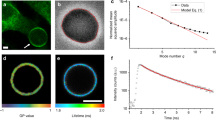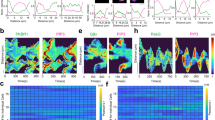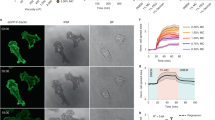Abstract
Cellular growth control and differentiation have been shown to be dependent on both cell–cell and cell–substrate contacts1. Interactions of cells with extracellular material are critical events during embryonic development and maintenance of tissue function2. Plasma membrane receptors have been described for components of the extracellular matrix such as fibronectin, laminin and various collagen types3. Transmembrane signalling has been shown to be influenced by the lateral mobilities of the plasma membrane constituents4. The interaction of cells with their extracellular matrix could thus have a significant effect on the mobility properties of the plasma membrane components5. Here we have studied the dynamic properties of fluorescent membrane phospholipids in bovine endothelial cells using fluorescence recovery after photo bleaching measurements. At this molecular level we find that the phospholipid lateral diffusion coefficient is dependent on the substrate upon which cells are allowed to adhere (collagen, fibronectin or a natural basement membrane) and on the topography of the cell (basal versus apical plasma membrane).
This is a preview of subscription content, access via your institution
Access options
Subscribe to this journal
Receive 51 print issues and online access
$199.00 per year
only $3.90 per issue
Buy this article
- Purchase on Springer Link
- Instant access to full article PDF
Prices may be subject to local taxes which are calculated during checkout
Similar content being viewed by others
References
Folkman, J. & Moscona, A. Nature 273, 345–349 (1978).
Yamada, K. M. (ed.) Cell Interactions and Development Molecular Mechanisms (Wiley, New York, 1983).
Klebe, R. J. Nature 250, 248–251 (1974).
Axelrod, D. J. Membrane Biol. 75, 1–10 (1983).
Koppel, D. E., Sheetz, M. P. & Schindler, M. Proc. natn. Acad. Sci. U.S.A. 78, 3576–3580 (1981).
Hay, E. D. J. Cell Biol. 91, 205–216 (1981).
Avnur, Z. & Geiger, B. J. molec. Biol. 153, 361–379 (1981).
Schroit, A. J. & Pagano, R. E. Cell 23, 105–112 (1981).
Smith, B. A. & McConnell, H. M. Proc. natn. Acad. Sci. U.S.A. 75, 2759–2763 (1978).
Pochrand, I., Brillante, A. & Möbius, D. Chem. Phys. Lett. 69, 499–504 (1980).
Reitz, J. R., Milford, F. J. & Christy, R. W. Foundations of Electromagnetic Theory (Addison Wesley, New York, 1980).
Taylor, R. B., Duffus, W. P. H., Raff, M. C. & de Petris, S. Nature new Biol. 233, 225–229 (1971).
McKanna, J. A., Haigler, H. T. & Cohen, S. Proc. natn. Acad. Sci. U.S.A. 76, 5689–5693 (1979).
Geiger, B., Avnur, Z. & Schlessinger, J. J. Cell Biol. 93, 495–500 (1982).
Author information
Authors and Affiliations
Rights and permissions
About this article
Cite this article
Nakache, M., Schreiber, A., Gaub, H. et al. Heterogeneity of membrane phospholipid mobility in endothelial cells depends on cell substrate. Nature 317, 75–77 (1985). https://doi.org/10.1038/317075a0
Received:
Accepted:
Issue Date:
DOI: https://doi.org/10.1038/317075a0
This article is cited by
-
Fluorescence interference-contrast microscopy on oxidized silicon using a monomolecular dye layer
Applied Physics A Materials Science & Processing (1996)
Comments
By submitting a comment you agree to abide by our Terms and Community Guidelines. If you find something abusive or that does not comply with our terms or guidelines please flag it as inappropriate.



